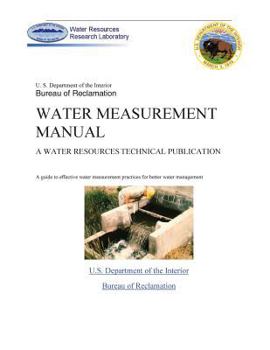Water Measurement Manual 3rd Edition, Revised Reprint
Public concepts of how to share and manage the finite supplies of water are changing. Increasingcompetition exists between power, irrigation, municipal, industrial, recreation, aesthetic, and fishand wildlife uses. Within the United States, critical examinations of water use will be based onconsumption, perceived waste, population density, and impact on ecological systems andendangered species. Water districts will need to seek ways to extend the use of their shares ofwater by the best available technologies. Best management measures and practices withoutexception depend upon conservation of water. The key to conservation is good watermeasurement practices.As district needs for water increase, plans will be formulated to extend the use of water. Ratherthan finding and developing new sources, water often can be less expensively provided byconservation and equitable distribution of existing water supplies. Every cubic foot of waterrecovered as a result of improving water measurement produces more revenue than the sameamount obtained from a new source. Better measurement procedures extend the use of waterbecause poor operation and deterioration usually result in the delivery of excess water to users orlose it through waste. Beyond the district or supply delivery point, attention to measurement, management, and maintenance will also extend the farmer's water use and help prevent reducedyields and other crop damage caused by over-waterin
Format:Paperback
Language:English
ISBN:1539692108
ISBN13:9781539692102
Release Date:January 1
Publisher:Createspace Independent Publishing Platform
Length:318 Pages
Weight:1.91 lbs.
Dimensions:0.7" x 8.5" x 11.0"
Customer Reviews
0 rating





